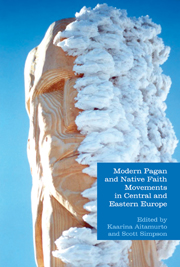Book contents
- Frontmatter
- Contents
- Contributors
- 1 Introduction: Modern Pagan and Native Faith Movements in Central and Eastern Europe
- Part I Overviews
- Part I Country Studies
- Part III Thematic Studies
- 18 The Ideology of Jan Stachniuk and the Power of Creation
- 19 “Imported” Paganisms in Poland in the Twenty-First Century: A Sketch of the Developing Landscape
- 20 The Russian-Language Internet and Rodnoverie
- Bibliography
- Index
18 - The Ideology of Jan Stachniuk and the Power of Creation
from Part III - Thematic Studies
- Frontmatter
- Contents
- Contributors
- 1 Introduction: Modern Pagan and Native Faith Movements in Central and Eastern Europe
- Part I Overviews
- Part I Country Studies
- Part III Thematic Studies
- 18 The Ideology of Jan Stachniuk and the Power of Creation
- 19 “Imported” Paganisms in Poland in the Twenty-First Century: A Sketch of the Developing Landscape
- 20 The Russian-Language Internet and Rodnoverie
- Bibliography
- Index
Summary
In the twenty-first century, the almost legendary figure of Jan Stachniuk (1905–63) continues to tower over the landscape of the Polish Neopagan movement. There are Neopagan groups which strive to present their activities as a direct continuation of his mortal efforts, and there are groups which consciously attempt to disassociate and distance themselves from his name and image, but it is difficult to remain entirely aloof from his legacy. Stachniuk's unique ideology and its specialized jargon have been interpreted, misinterpreted, and reinterpreted in a rich variety of ways. He called himself a nationalist. The press called him a Neopagan. But in important ways, Stachniuk's thought was too original to it easily into anyone else's categories.
In the 1930s in Poland, Roman Catholicism was the dominant ideology. It might even be said—although this is a simplification—that the majority of all political groups considered Roman Catholicism to be a fundamental and permanent value. Most agreed that the socio-political system of Poland should be based in Catholic ethics. The major opposition party in the Second Republic of Poland, the National Democrats, went so far as to postulate the conception of the Catholic State of the Polish Nation. The rare exceptions were a small number of parties with Jewish religious affiliation and a handful of expressly atheist communists and socialists, and even these were numerically small.
The ideological environment of the Zadruga movement, concentrated around its founder Jan Stachniuk, looks exceptional when seen against this background. Stachniuk decided to break off with the dominant ideological trend in Poland: with the Catholic viewpoint on anthropological, constitutional questions, and those concerning philosophy of history.
- Type
- Chapter
- Information
- Publisher: Acumen PublishingPrint publication year: 2013



